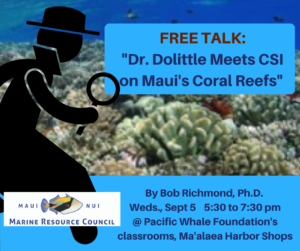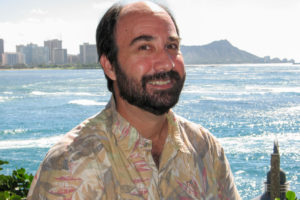Free Talk: “Dr. Dolittle Meets CSI on the Coral Reefs of Maui” on September 5, 2018
Forensics and diagnostics are all part of the scientific study of coral reefs, which is why Bob Richmond Ph.D., Research Professor and Director of Kewalo Marine Laboratory at the University of Hawaii at Manoa, will be presenting a free talk titled, “Dr. Dolittle Meets CSI on the Coral Reefs of Maui” at the upcoming September 5 meeting of the Maui Nui Marine Resource Council. This event will take place from 5:30 to 7:30 pm at Pacific Whale Foundation’s classrooms at the ocean-facing lower level of the Ma’alaea Harbor Shops, 300 Ma’alaea Road, Ma’alaea (next to Maui Ocean Center).
 Dr. Richmond’s talk will explain how his team is using diagnostics and forensics to identify causes of stress to Maui’s reefs at Olowalu, Waihikuli, amd Honokowai, along with ways to enhance the reef’s resistance to these stressors.
Dr. Richmond’s talk will explain how his team is using diagnostics and forensics to identify causes of stress to Maui’s reefs at Olowalu, Waihikuli, amd Honokowai, along with ways to enhance the reef’s resistance to these stressors.
Dr. Richmond’s childhood fascination with Dr. Dolittle helped inspire his approach to studying reefs by “listening” to coral reefs and other reef creatures through the use of ecological indicators and molecular biomarkers.
“Maui has some of the most well developed coral reefs in the Main Hawaiian Islands, but these have been negatively affected by local and global stressors including land-based sources of pollution and sedimentation from watershed discharges, overfishing, and bleaching due to climate change,” said Dr. Richmond.
“Our research blends traditional ecological knowledge with ecology and molecular biology to both diagnose and treat the causes of coral reef decline,” he noted. “Our approach can best be described as Dr. Dolittle meets CSI (crime scene investigations) on coral reefs and uses a combination of diagnostics and forensics.”
“The results of our reef studies on reefs at Waihikuli, Honokowai and Olowalu will be presented and ideas for helping these reefs recover will be discussed,” he said.
 Dr. Richmond is the Chair of the Maui Coral Reef Recovery Team, a group of Hawaii’s most recognized coral reef scientists, resource managers, fishers, cultural advisors and communitymembers, first convened by Maui Nui Marine Resource Council in 2010. The group wrote the Maui Coral Reef Recovery Plan, a 101-page science-based plan that outlines specific goals and steps to protect Maui’s coral reefs. Team members continue to meet regularly to provide guidance and monitor progress toward implementing the plan.
Dr. Richmond is the Chair of the Maui Coral Reef Recovery Team, a group of Hawaii’s most recognized coral reef scientists, resource managers, fishers, cultural advisors and communitymembers, first convened by Maui Nui Marine Resource Council in 2010. The group wrote the Maui Coral Reef Recovery Plan, a 101-page science-based plan that outlines specific goals and steps to protect Maui’s coral reefs. Team members continue to meet regularly to provide guidance and monitor progress toward implementing the plan.
Dr. Richmond has spent the majority of his professional career studying coral reefs in Micronesia, Hawaii, Japan, Central America, the Galapagos Islands and the Caribbean. His research interests are in the area of marine conservation biology, with a focus on coral reefs. His research programs include studies of coral reproductive biology, ecotoxicology, coral reef ecology, the impacts of climate change and bridging sound science to policy development and implementation.
Dr. Richmond received a Ph.D. in Biological Sciences from the Dept. of Ecology and Evolution, SUNY at Stony Brook, and subsequently spent two years as a postdoctoral fellow at the Smithsonian Tropical Research Institute in Panama, 18 years on the faculty of the University of Guam Marine Laboratory, and has been a Research Professor at the Pacific Biosciences Research Center, University of Hawaii at Manoa, since 2004.
Maui Nui Marine Resource Council is funding Dr. Richmond’s studies of corals in Olowalu and Ma’alaea. A nonprofit organization founded in 2007, Maui Nui Marine Resource Council is working for clean ocean water, healthy coral reefs and an abundance of native fish for the islands of Maui County. To learn more, visit www.mauireefs.org.



No Comments
Sorry, the comment form is closed at this time.